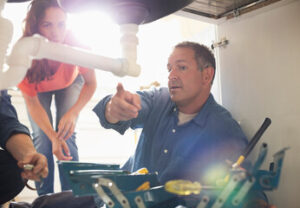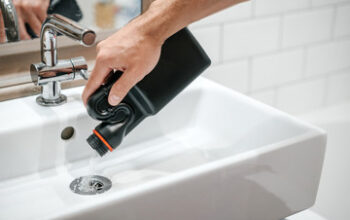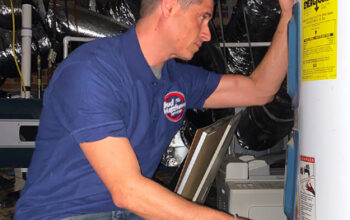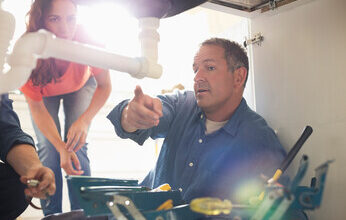Plumbers are responsible for installing, repairing, and maintaining pipes that carry water, gas, and waste in residential and commercial settings. They work with various tools and must have physical stamina to lift heavy objects and work in tight spaces.
Plumbers must also understand building codes and regulations when interpreting blueprints and plans for new construction projects. They must also have excellent customer service skills to interact with clients. For more information, click the link https://www.prescherplumbing.com/ provided to proceed.

One of the main services that plumbers offer is installation. They install new pipes, fixtures, and appliances to ensure water runs properly through a home or building. This can include setting up toilets, showers, faucets, sinks, and dishwashers. Plumbers also set up gas plumbing for stoves and heating systems. They use blueprints and architectural drawings to determine where to put the pipes and ensure all components are connected correctly.
A plumber may also need to repair or replace old fixtures. This can be due to wear and tear or the fixture is no longer efficient or safe. The plumber must inspect the old fixture to see what caused it to stop working or break down. They will then remove the old fixture and install the new one, ensuring it connects to all the necessary piping and valves.
Some plumbers specialize in residential or commercial plumbing, while others focus on either. They can be employees of a company, or they can work independently. They may also need to be licensed, depending on the state in which they work.
The plumbing industry is regulated, and plumbers must be knowledgeable about local codes, safety regulations, and proper installation procedures. They also need the skills to work with various tools, including power and hand tools, drills, pipe cutters, and wrenches. Many plumbers also need to be comfortable working in confined spaces and crawlspaces, as well as in high places like attics or ceilings. They must also be able to read and follow blueprints. They must also be willing to work overtime, as they are often called upon for emergency repairs or installations.
Plumbing maintenance ensures that pipes, fixtures, and appliances function properly. Plumbers typically offer services, including inspections to identify potential issues, repair existing systems, and install new components. They may also help with water conservation and energy efficiency in homes and businesses.
Maintenance services include unclogging drains and repairing toilets and faucets, fixing leaky pipes, and replacing old and damaged parts. Plumbers also test gas lines and ensure that appliances like stoves and ovens work safely. If they notice any problems, they’ll notify the homeowner or business owner and recommend a solution.
Installing plumbing systems is another key part of this trade, and it involves ensuring that all components fit together correctly and adhere to local building codes. This can include laying pipes, connecting appliances to water supply and drainage lines, and installing sinks, toilets, and bathtubs. Plumbers use various tools to carry out these tasks, including specialized equipment like drills and snakes for drain cleaning, power flushing, and water testing tools for boilers and central heating systems.
Commercial and industrial settings present unique challenges for plumbers, who may be called upon to repair or inspect large-scale piping and plumbing systems in office buildings, retail spaces, warehouses, and factories. These larger-scale systems often feature complex piping and plumbing components that serve multiple occupants simultaneously. Plumbers who work in these environments must be able to collaborate with construction teams and other professionals to ensure that all components are installed correctly and functioning properly.
While hard skills such as technical knowledge and physical stamina are important for plumbers, soft skills such as effective communication and problem-solving are just as crucial. Because plumbers often interact directly with clients, they must be able to explain complicated issues in straightforward terms and provide clear, accurate estimates for their work.
One of the most common jobs for plumbers is repairing damaged pipes and fixtures. This can include fixing leaking taps, toilets that aren’t flushing properly, and clogged drains and sinks. Plumbers also repair water heaters and other appliances that use water in a home or business. They may even be called to inspect a property’s sewer system and replace damaged or aging pipes.
Plumbers often work with dangerous materials, including toxic chemicals and human waste. For this reason, they must follow strict safety protocols when working on any plumbing project. They must also know the appropriate tools and equipment for each task. For example, a plumber who works on sewage systems must be aware that they are dealing with raw sewage, which can contain dangerous microbes like cholera and typhoid. Moreover, they must wear protective clothing and masks when working with this material.
Besides repairing faulty taps and toilets, plumbers can help owners save money on their energy bills by installing new, water-efficient fixtures. They can recommend and install energy-efficient hot water systems, showerheads, and faucets. These fixtures will reduce a homeowner’s energy costs and help the environment by using less natural resources.
Another important service that plumbers provide is detecting and fixing leaks in the pipes. Leaks in the plumbing can cause extensive damage if not addressed quickly. Plumbers can fix leaks in various house parts, including under sinks, behind walls, and attic. Most plumbers will use a special tool to find and pinpoint the leak’s location.
Regardless of the type of plumbing repair, a plumber must have excellent customer service skills to ensure the satisfaction of their clients. They must be able to listen carefully to the customers’ concerns and understandably explain the problem. Furthermore, a plumber must be willing to work on-call and respond to emergencies when they occur.
The plumbing system in a home or business carries clean water to fixtures like faucets, showers and tubs, toilets, outdoor fixtures, and appliances like dishwashers and washing machines. It also routes waste out of the building through drain pipes to the sewer system or septic tank. A plumber’s job is to ensure these systems function properly by inspecting, testing, and repairing them as needed. Plumbers need many skills to perform their duties, from physical stamina and agility to customer service and communication.
During a visual inspection, a plumber will examine all accessible pipes for leaks, corrosion, and damage. They will check the water pressure and test the flow rate of fixtures like sinks, showers, and tubs to ensure they work properly. They will also inspect the water heater to assess its age, performance, and safety. Finally, they will test all drain lines for clogs and proper flow.
If a plumbing inspector finds issues with a sewer line, the problem must be resolved quickly to prevent serious damage and health risks. These problems include sewage backflow, which can cause rashes, diarrhea, other dangerous diseases, and costly property damage. A plumber will use special tools to locate and repair the problem, including cutting through walls and floors.
During a camera inspection, a plumber will use a high-resolution camera to look inside your pipes and sewer lines. This allows them to see what’s causing a clog or blockage and determine the best course of action for repairs. The plumber can then take steps to clear the obstruction and restore normal flow. This may involve digging up and replacing damaged pipe sections or as simple as clearing out debris accumulated in the line.
A plumber must have excellent customer service skills, as they often interact with clients when installing or repairing plumbing fixtures. They must explain complex issues in easy-to-understand terms and give customers accurate cost estimates. Plumbers also need critical thinking skills to assess problems and determine the best action. They must be physically strong enough to lift heavy equipment and tools.
Plumbers can work for a variety of businesses and industries. Some choose to specialize in residential or commercial plumbing, while others focus on specific types of equipment or projects, such as water heaters or sewer systems. Plumbers can also find jobs in sales, marketing, or management, depending on their specific skill sets and areas of expertise.
Most plumbers undergo extensive training through an apprenticeship program, which combines classroom instruction with on-the-job training. Upon completion, they must pass an exam to become licensed in their state. Plumbers may also pursue additional certifications to improve their knowledge and skills in specific field areas.
A plumber’s workplace environment depends on the project type and location. In residential settings, plumbers may need to work in tight and confined spaces where they must navigate around furniture and other fixtures. They also work outdoors and on construction sites, where they must follow safety protocols when working with electricity or other hazardous materials.
A plumber’s duties focus on installing, maintaining, and repairing plumbing systems in homes, businesses, and other structures. They often work with a team of other professionals to ensure that building projects incorporate appropriate plumbing infrastructure. They may also need to consult with clients, review blueprints, and inspect existing plumbing systems to identify problems and potential hazards.



